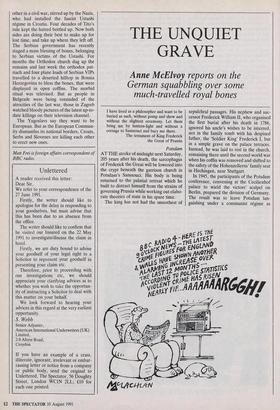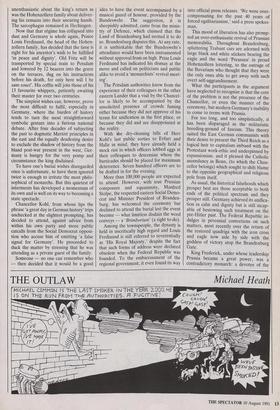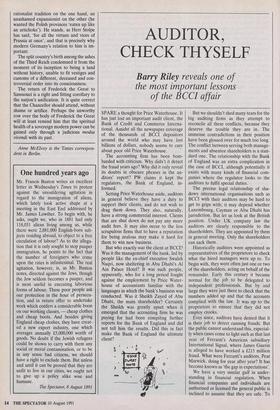THE UNQUIET GRAVE
Anne McElvoy reports on the
German squabbling over some much-travelled royal bones
I have lived as a philosopher and want to be buried as such, without pomp and show and without the slightest ceremony. Let them bring me by lantern-light and without a corsage to Sanssouci and bury me there.
The testament of King Frederick the Great of Prussia
Potsdam AT THE stroke of midnight next Saturday, 205 years after his death, the sarcophagus of Frederick the Great will be lowered into the crypt beneath the garrison church in Potsdam's Sanssouci. His body is being returned to the palatial retreat which he built to distract himself from the strains of governing Prussia while working out elabo- rate theories of state in his spare time.
The king has not had the smoothest of sepulchral passages. His nephew and suc- cessor Frederick William II, who organised the first burial after his death in 1786, ignored his uncle's wishes to be interred, not in the family tomb with his despised father, the 'Soldier King' Frederick I, but in a simple grave on the palace terraces. Instead, he was laid to rest in the church, remaining there until the second world war when his coffin was removed and shifted to the safety of the Hohenzollerns' family seat in Hechingen, near Stuttgart.
In 1945, the participants of the Potsdam conference, convening at the Cecilienhof palace to wield the victors' scalpel on Berlin, prepared the division of Germany. The result was to leave Potsdam lan- guishing under a communist regime as unenthusiastic about the king's return as was the Hohenzollern family about deliver- ing his remains into their uncaring hands. The sarcophagus remained in Hechingen.
Now that that regime has collapsed into dust and Germany is whole again, Prince Louis Ferdinand, the head of the Hohen- zollern family, has decided that the time is right for his ancestor's wish to be fulfilled `in peace and dignity'. Old Fritz will be transported by special train to Potsdam and lowered by 12 bearers into the grave on the terraces, dug on his instructions before his death, for only here will I be sans souci'. His coffin will join those of his 13 favourite whippets, patiently awaiting their master for over two centuries.
The simplest wishes can, however, prove the most difficult to fulfil, especially in Germany, where the burden of history tends to turn the most straightforward symbolic gesture into a furious national debate. After four decades of subjecting the past to dogmatic Marxist principles in the east and the equally deadening desire to exclude the shadow of history from the bland post-war present in the west, Ger- many is hungry for the very pomp and circumstance the king disdained.
To have one's burial wishes disregarded once is unfortunate, to have them ignored twice is enough to irritate the most philo- sophical of monarchs. But this quietest of interments has developed a momentum of its own and is well on its way to becoming a state spectacle.
Chancellor Kohl, from whose lips the phrase 'a great day in German history' trips unchecked at the slightest prompting, has decided to attend, against advice from within his own party and more public catcalls from the Social Democrat opposi- tion who accuse him of emitting 'a false signal for Germany'. He proceeded to duck the matter by stressing that he was attending as a private guest of the family.
Someone — no one can remember who — then decided that it would be a good idea to have the event accompanied by a musical guard of honour, provided by the Bundeswehr. The suggestion, it is sheepishly admitted, came from the minis- try of Defence, which claimed that the Land of Brandenburg had invited it to do so. Brandenburg disputes this. At any rate, it is unthinkable that the Bundeswehr's attendance would have been instrumented without approval from on high. Prinz Louis Ferdinand has indicated his dismay at the move and called on politicians and public alike to avoid a 'monarchists' revival meet- ing'.
The Potsdam authorities know from the experience of their colleagues in the other eastern Lander that a visit by the Chancel- lor is likely to be accompanied by the unsolicited presence of crowds fuming either because they did not approve of his terms for unification in the first place, or because they did and are disappointed at the reality. With the dry-cleaning bills of Herr Kohl's last public sorties to Erfurt and Halle in mind, they have already held a mock riot in which officers lobbed eggs at their colleagues to determine where the barricades should be placed for maximum deterrence. Seven hundred officers are to be drafted in for the evening.
More than 100,000 people are expected to attend. However, with true Prussian composure and equanimity, Manfred Stolpe, the respected eastern Social Demo- crat and Minister President of Branden- burg, has welcomed the ceremony but declined to attend the burial lest the event become — what limitless disdain the word conveys — a Trimborium' (a right to-do). Among the townspeople, the dynasty is held in uncritically high regard and Louis Ferdinand is still referred to reverentially as 'His Royal Majesty,' despite the fact that such forms of address were declared obsolete when the Federal Republic was founded. To the embarrassment of the regional government, it even found its way into official press releases. 'We were over- compensating for the past 40 years of forced egalitarianism,' said a press spokes- man.
This mood of liberation has also promp- ted an over-enthusiastic revival of Prussian memorabilia. Throughout Brandenburg, spluttering Trabant cars are adorned with large black and white stickers bearing the eagle and the word 'Preussen' in proud Hohenzollern lettering, to the outrage of the Bavarians who thought that they were the only ones able to get away with such overt self-aggrandisement.
What the participants in the argument have neglected to recognise is that the core of the problem is not the presence of the Chancellor, or even the manner of the ceremony, but modern Germany's inability to come to terms with Prussia.
For too long, and too simplistically, it has been disparaged as the militaristic breeding-ground of fascism. This theory suited the East German communists with their desire to present the Third Reich as a logical heir to capitalism imbued with the Protestant work-ethic and underpinned by expansionism. and it pleased the Catholic ascendancy in Bonn, (to which the Chan- cellor belongs) which sought to shift blame to the opposite geographical and religious pole from itself.
As usual, the historical falsehoods which prosper best are those acceptable to both ends of the political spectrum and they prosper still. Germany achieved its unifica- tion in calm and dignity but is still incap- able of bestowing such treatment on the pre-Hitler past. The Federal Republic in- dulges in perennial contortions on such matters, most recently over the return of the restored quadriga with the iron cross and eagle now side by side with the goddess of victory atop the Brandenburg Gate.
King Frederick, under whose leadership Prussia became a great power, was a contradictory monarch: a devotee of the rationalist tradition on the one hand, an unashamed expansionist on the other (he wanted the Polish provinces 'eaten up like an artichoke'). He stands, as Herr Stolpe has said, 'for all the virtues and vices of Prussia at once', and that is precisely why modern Germany's relation to him is im- portant.
The split country's birth among the ashes of the Third Reich condemned it from the moment of its inception to being a land without history, unable to fit vestiges and customs of a different, deceased and con- troversial order into its consciousness.
The return of Frederick the Great to Sanssouci is a right and fitting corollary to the nation's unification. It is quite correct that the Chancellor should attend, without shame or artifice. Perhaps the unworthy row over the body of Frederick the Great will at least remind him that the spiritual health of a sovereign modern power can be gained only through a judicious modus vivendi with its past.
Anne McElvoy is the Times correspon- dent in Berlin.




















































 Previous page
Previous page